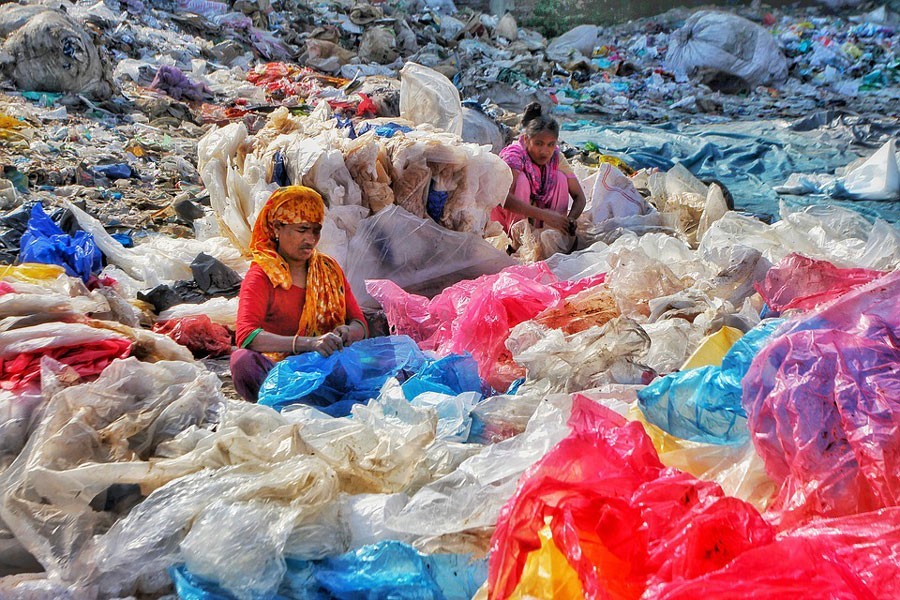Around 300 million tons of plastic are produced yearly; 14 per cent of that amount is recycled, and the remainder is ocean debris ranging from surface water to deep-sea feculences.
New UNEP regulations are compelling multinational conglomerates to limit their plastic footprints by enforcing sanctions and pushing them to adapt to recycling, thus fostering a circular economy of plastics in which plastic trash is minimal and old plastics are recycled.
Developing countries like Bangladesh need to see the potential
A report published by 'Our World in Data shows that Developed countries are the biggest consumers and producers of plastic products, accountable for almost 70 per cent of global plastic production and consumption with an estimated USD 405 billion worth.
But these countries lack the motivation and infrastructure for recycling as only 6 per cent of the global recycling happen in developed countries resulting in extensive plastic pollution and irreparable environmental damage.
This opens the door to opportunities for countries like Bangladesh to mark their presence in the global market through the concept of the plastic circular economy.
The ever-growing plastic pollution is now in an alarming state, and without a solution, there would be numerous inevitable catastrophes.
According to a study by the 'Ellen MacArthur Foundation,' the only solution to plastic pollution is to develop a robust circular economy of plastic where each stage of plastics is considered from production to consumption. Furthermore, a study shows that plastic's circular economy benefits the environment and creates strong economic and social benefits.
The circular economy is where chaffs of consumption are extensively recycled, reused and refurbished, and wastes are minimised to prevent pollution of nature. Circulating the products to their optimum value must be regenerative in nature based on three basic principles of eliminating pollution.
The regenerative nature of the plastic circular economy can aid in creating a self-sustainable economic structure that is profitable from the core of its structure. As the market demand for plastic has no sign of abating in the foreseeable future due to the lack of substitute products, the circular economy of plastic could be the tenable solution the world's governments are looking for.
Many countries are planning to subsidise the plastic circular economy as a part of their mission to combat climate change. This phenomenon across the globe has been able to push their start-up eco-system to be more eco-friendly. As a result, many start-ups based on a plastic circular economy have come out recently, focusing on multiple dimensions of plastic recycling products.
The estimated market value of the total recyclable discarded plastic dross by Statista is around USD 60.4 billion. With a CAGR (Compound Annual Growth Rate) of 4.8 per cent, almost a quarter per cent of the total plastic consumption will be recycled by 2030, with a valuation of over USD 90 billion, making it one of the most profitable sectors for businesses. And as a country, highly vulnerable to climate change and pollution, Bangladesh can put forth a strong effort to set up a strong circular economy of plastic and become a global leader in combating climate change and plastic pollution.
Eco-start-ups can flourish
There are primarily solid or rigid plastics recycled. However, flexible single-use plastics such as Polypropylene packets, shopping bags, straws, and bottle caps stay as dross, resulting in an ecological catastrophe for marine life and the environment.
The inadequate technological solutions to process the flexible plastic dross are why plastics end up as oceanic debris. Furthermore, these polypropylene materials are challenging to convert into liquid fuel due to the complex composition of numerous layers of various components that are layered on one another.
Scientists are working tirelessly to find a sustainable business solution to this problem, as pyrolysis technology is expensive and still has no industrial resolution, making it a rising concern among the authorities and businesses.
Several start-ups have emerged to solve the complexities of processing flexible plastics for recycling. For example, 'TrashCon' an Indian trash-tech start-up focused on sorting and processing trash for recycling, successfully devised a way of processing flexible plastics and is highly appreciated and supported by the local government and authorities.
Fostering and subsidising such start-ups by the governments of developing nations across the world can help in the combat against plastic pollution.


